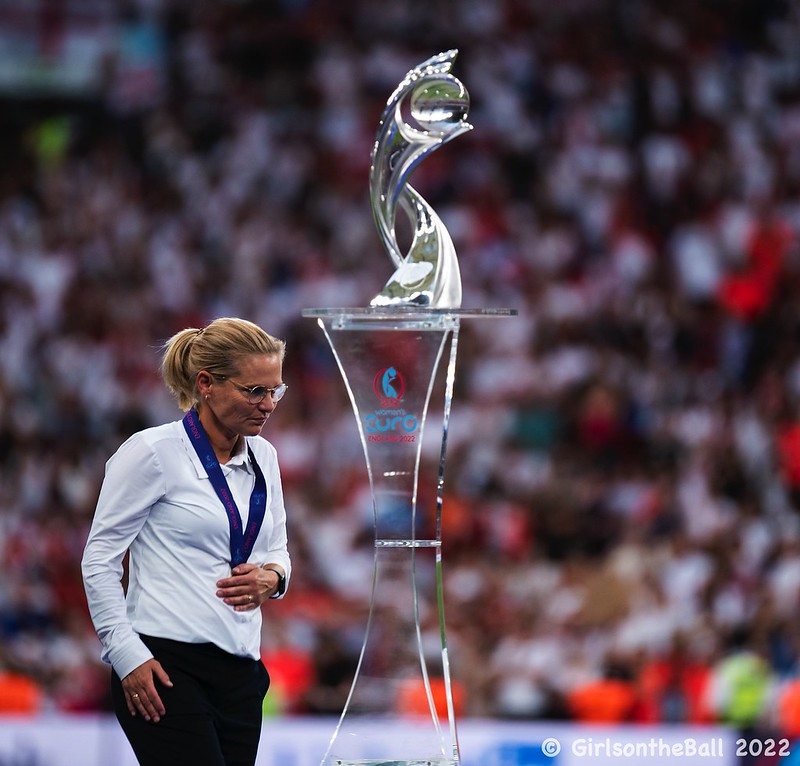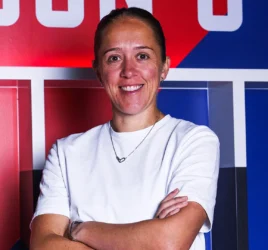“I just really want to win. We want to be the best; I want to be the best. That is what motivates me,” England manager Sarina Wiegman says as she sits down to chat to the traveling media on the Sunshine Coast. “What gives me energy is working with a team. We have so many talented players and my job is to get clarity on how we play together… And then it’s to get players connected, because that’s why team sports are so nice. If you get connected, you understand each other really well… that gives me energy.”
Calm, humble, open, proud… those are just four words that came to mind as we sat down with Wiegman just under ten days ahead of England’s World Cup opener. It will be the Dutch native’s fifth major tournament – fourth as manager – and it is fair to say her record so far is exemplary. Two European Championship wins and one World Cup silver medal say it all for a coach who has played a huge part in changing the game both at home in the Netherlands and now with the Lionesses.
She is, as expected, unwilling to take the credit herself, preferring to push it onto those around her. “You can’t do [it] without a good team, because when you don’t have good players, you can still be a coach, but you’re never going to win tournaments,” she states. “You need the players and good collaboration, and you need good staff and support so everything in the puzzle needs to be right.”
This humility, however, should not be mistaken for a lack of ambition. Her role may have altered but her desire to change the sport has been there since her playing days. It was not easy for a player who grew up in a generation where women’s football was far from accepted. “I’m aware that, from a little kid, I loved football,” she remembers. “I don’t know why. I loved sports, so I did so many different sports, but it was always football. As you know, as a little girl, when I was five/six years old, girls were not allowed to play. But I just liked [it], and my parents never made any [fuss]. They just said, “If you want to play football, you’re going to play football”.

Wiegman made her debut for the Netherlands at the age of 17 and in 1988 was part of the squad invited to FIFA’s Invitation Tournament in China where they reached the quarter-finals. A meeting with the then USA head coach, Anson Dorrance, saw her head to and play for the University of North Carolina, a move she credits with lighting a fire inside her to make change happen. “It was an absolute trigger for me,” she notes. “When I went back, I thought if I can contribute in the Netherlands to make it what is there [US], I would be a happy person. It took 20 years.”
Her playing days have naturally translated into her development as a manager. She remains serious and driven – “I was pretty serious [as a player] – as you can imagine,” she states somewhat off the cuff – but her ability to connect with and get the best out of her players has been key: “You have to try and find balance. Now, the players know what they’re doing so there’s trust. If you give them responsibilities, they will take the responsibility. I trust [them] and it’s a trust and safe environment we’ve created. What we see on the pitch, they work so hard and do everything that’s necessary. Then you have to find a moment to rest or do other things to get your head space and get connected with family, because they’re not robots.”
The development of the sport even now catches her by surprise, despite being at the very heart of it. She talks with immense satisfaction about the Lionesses’ desire to continue that change after winning the Euros last summer. “I’m incredibly proud of their social consciousness,” she says. “It’s so powerful, so strong, and they articulate themselves so well. And they were ready the day after the final to put that letter in. There’s so much leadership in this team. They really want to have a positive impact on society and a positive change…And now what we try to do is keep performing, keep being visible and keep using our voices to also sustain and make positive changes.”

First up on the list is the game against Haiti on 22 July. Pre-tournament preparations started a month ago as the build-up to the tournament gathers pace. Based on the Sunshine Coast for the last ten days, England have struck a balance between hard work and time off to recharge. Wiegman jumped at the chance to go whale watching with the team, catching the humpbacks who are currently migrating through the Pacific. “I loved it” she recollects. “I liked the speed of the boat too. That was really nice, just to do something else.”
For a modern-day manager, especially with a huge tournament ahead, that down time is hard to come by, especially when you are as football-obsessed and motivated as Wiegman. “You all made me aware that I’ve based my life around football,” she says with a smile. “But I’m just me and doing what I like, and the opportunities just arose around developing the game. It’s not [about] what I do all the time, that’s what lots of people do and then I’m getting the opportunities. I’m very thankful and grateful that has changed. I’m just doing the things that I love the most. I think that’s special. Of course, I really love the medals, but what I’m proud of most, absolutely most, is that now young girls have perspective and young girls can play football and can wear shirts to show whichever (player’s) achievement. That makes me the proudest.”


